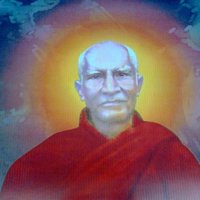Ven. Anandajoti (trans.), SuttaCentral.net (SN 5.19); edited by Dhr. Seven, Wisdom Quarterly
Verses on the Recital of the Way to the Beyond
Venerable Piṅgiya* said, “I will recite the Way
to the Beyond,” as he saw it, so he explained:
“Unstained, of great intelligence
is the one free from sense desire,
the Disentangled One, the Strong One.
Why should he speak falsely?
“Of the one who gave up stain and delusion,
who gave up conceit and malevolence,
come now, I will proclaim this lyric
which is endowed with beauty:
“The Buddha, the Darkness-Dispeller, the All-Seeing Visionary,
who has gone to the end of the world, transcended all rebirth,
abandoned all suffering, the one pollutant-free,
whose very name is truth — O Brahmin, you are venerated by me!
“Just as a bird who has given up a barren woodland,
might live in a forest which has much fruit,
so too I have given up those of little wisdom,
like a swan who has arrived at the great sea.
“Those who explained things to me in the past, before
Gautama’s Teaching, saying, ‘It was so, and so it will be,’
all that was just hearsay,
all that just increased my thoughts.
“Alone sits the Darkness-Dispeller,
the Bright One, the Light-Maker,
Gautama of Great Knowledge,
Gautama of Great Intelligence.
“He who to me taught the Teaching,
which is visible, not subject to time,
the end of craving, beyond calamity,
for which there is nowhere a likeness.”
Bāvari: “Then why do you dwell apart from him,
even for a second, Piṅgiya,
from Gautama of Great Knowledge,
Gautama of Great Intelligence,
“He who to you taught the Teaching,
which is visible, not subject to time,
the end of craving, beyond calamity,
for which there is nowhere a likeness?”
“I would not dwell apart from him
even for a second, Brahmin,
from Gautama of Great Knowledge,
Gautama of Great Intelligence,
“He who to me taught the Teaching,
which is visible, not subject to time,
the end of craving, beyond calamity,
for which there is nowhere a likeness.
“I see him in my mind as though with the eye,
as I dwell heedful night and day, Brahmin.
Revering him I make the night pass by,
for that reason, I think there is no real dwelling apart.
“My confidence, happiness, mind, and mindfulness,
do not depart from Gautama’s teaching.
Whatever direction the One of Great Wisdom goes to
it is that very place that I am inclined.
“I am old, without strength, and feeble,
because of that my body does not go there,
but by an effort of thought I always go,
for my mind, Brahmin, is joined to him.
“Lying down in a quagmire I was trembling,
I drifted from island to island,
then I saw the Supreme Buddha,
the flood-crosser, the one pollutant-free.”
The Buddha said:
“Just as Vakkali released his confidence —
and Bhadrāvudha, and Āḷavi-Gautama —
just like that you must release your confidence,
and you will go, Piṅgiya, beyond the Realm of Death.”
“I am more and more sure about this,
having heard the sage’s word,
the cover-remover, the Supreme Buddha,
who is unhindered, assured in speech,
“Who knows the great devas, who has understood
everything far and near,
the Teacher who makes an end of questions in them
by making them known.
“The Indestructible, the Unagitated,
for which there is nowhere a likeness,
Surely, I will go there; about this I have no doubt.
Thus, bear me in mind as one whose heart is intent on nirvana.”
The Discourse on Piṅgiya, the 16th, "The Way to the Beyond," is finished.
*Who was Pingiya?
G.P. Malalasekera (Dictionary of Pali Proper Names) edited by Dhr. Seven
 |
| A History of Pali Literature (Bimala Churn Law) |
At the end of his discussion with the Buddha, as recorded in the Pingiya Sutta (SN. vs. 1120-23), because of his feebleness, he failed to reach any attainment.
Thereupon he praised the Buddha and begged of him to continue to teach him. The Buddha taught him further, and Pingiya became a non-returner (anāgāmī), failing to attain full enlightenment (arhatship) because his mind wandered to his maternal uncle, Bāvarī. His 1,000 pupils, however, became fully enlightened (arahants).
Later, having asked the Buddha, he visited Bāvarī and told him about the Buddha's Teaching, describing the Buddha's qualities (SN. vv.1131-45).
At the end of his statement, the Buddha, seeing that the minds of both of them were now mature, sent forth a ray of light from Sāvatthi and, appearing before them, taught them the Dharma.
Thereupon Bāvarī became a non-returner and Pingiya an arahat (SNA.ii.603ff). Pingiya was called mānava even at the age of 120 (SNA.ii.413).






















































































































































































































































No comments:
Post a Comment